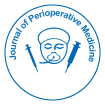
Journal of Perioperative Medicine
Open Access
ISSN: 2684-1290
+44 1478 350008

ISSN: 2684-1290
+44 1478 350008
Short Communication - (2024)Volume 7, Issue 2
Perioperative medicine is a multidisciplinary field of medicine that focuses on the care of patients before, during, and after surgery. In recent years, significant advancements in perioperative medicine have emerged, improving surgical outcomes and enhancing patient care. From preoperative assessment to postoperative care, these advancements are changing the way healthcare professionals approach surgery and patient management.
Preoperative assessment and optimization
One of the most significant advancements in perioperative medicine is the use of preoperative assessment and optimization to reduce the risk of complications and improve outcomes. Advances in diagnostic imaging, laboratory testing, and risk stratification tools have allowed healthcare professionals to identify and manage medical conditions that may increase the risk of complications during or after surgery [1].
The use of electronic health records and computerized decision support tools has also facilitated more comprehensive preoperative assessments and optimization. These tools allow healthcare professionals to access patient data quickly and efficiently, streamline decision making processes, and identify potential risks before surgery.
Anesthesia management
Advancements in anesthesia management have improved patient outcomes and reduced the risk of adverse events during surgery. The use of regional anesthesia, for example, has become increasingly popular, as it allows for reduced pain and faster recovery times. Advances in anesthetic agents and monitoring techniques have also improved patient safety and comfort during surgery.
One of the most significant advancements in anesthesia management is the use of Total Intravenous Anesthesia (TIVA) [2]. TIVA involves the continuous infusion of intravenous anesthetic agents, allowing for precise control of the depth of anesthesia and reducing the risk of adverse events such as postoperative nausea and vomiting. TIVA has also been shown to reduce the length of hospital stays and improve patient satisfaction.
Postoperative care
Advancements in postoperative care have focused on pain management, early detection and treatment of complications, and Enhanced Recovery After Surgery (ERAS) protocols. ERAS protocols involve a multimodal approach to patient care, including preoperative counseling, nutrition optimization, and physical therapy, aimed at reducing the stress response to surgery and improving outcomes [3].
One of the most significant advancements in postoperative pain management is the use of opioid sparing techniques. Opioidsparing techniques involve the use of alternative pain management strategies, such as regional anesthesia, non-opioid pain medications, and nerve blocks, to reduce the need for opioids after surgery. This approach has been shown to reduce the risk of opioid dependence, improve pain control, and enhance recovery after surgery.
Patient education
Advancements in patient education have improved patient understanding of surgical procedures, potential complications, and postoperative care. The use of multimedia educational tools, such as video based instructions and patient portals, has allowed patients to access information and resources easily. This has resulted in reduced anxiety and improved patient satisfaction.
The use of Virtual Reality (VR) technology in patient education has also shown promise. VR allows patients to experience surgical procedures in a simulated environment, improving their understanding of the surgical process and reducing anxiety. VR has also been used to provide preoperative relaxation therapy, which has been shown to reduce anxiety and improve patient outcomes [4,5].
Advancements in perioperative medicine have significantly improved surgical outcomes and patient care. From preoperative assessment to postoperative care and patient education, these advancements are changing the way healthcare professionals approach surgery and patient management. As technology continues to evolve, it is likely that further advancements will emerge, improving patient outcomes and enhancing the quality of care provided by healthcare professionals. Ultimately, the goal of perioperative medicine is to reduce the risk of complications and improve patient outcomes, and these advancements are bringing us closer to achieving this goal.
[Crossref] [Google Scholar] [PubMed]
[Crossref] [Google Scholar] [PubMed]
[Crossref] [Google Scholar] [PubMed]
[Crossref] [Google Scholar] [PubMed]
Citation: Lee H (2024) Advancements in Perioperative Medicine: Improving Surgical Outcomes. J Hortic. 07:209.
Received: 06-Mar-2024, Manuscript No. JPME-24-24128; Editor assigned: 08-Mar-2024, Pre QC No. JPME-24-24128 (PQ); Reviewed: 22-Mar-2024, QC No. JPME-24-24128; Revised: 29-Mar-2024, Manuscript No. JPME-24-24128 (R); Published: 05-Apr-2024 , DOI: 10.35248/2684-1290.24.7.209
Copyright: © 2024 Lee H. This is an open-access article distributed under the terms of the Creative Commons Attribution License, which permits unrestricted use, distribution, and reproduction in any medium, provided the original author and source are credited.